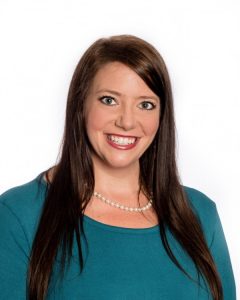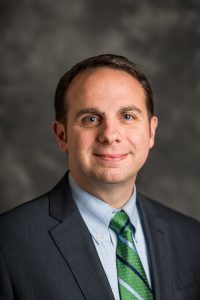Key Takeaways
- The BlueCross BlueShield of Tennessee Foundation donated $150,000 to fund minority scholarships at three Tennessee colleges.
- Tennessee Technological University, Chattanooga State Community College and Belmont University each received $50,000 to fund scholarships.
Most people have felt out of place at one time or another, whether it’s walking into a job interview or entering a new social situation. Some of us, however, experience that feeling in a space that should feel nurturing: college.
“While affordability is a major barrier to getting more women and minorities enrolled in the computer science program, the other obstacle is ‘imposter syndrome,’” says April Crockett, chair of the computer science diversity and inclusion committee at Tennessee Technological University in Cookeville.
“It’s a situation where students feel like a fraud in the program, like they don’t belong and maybe they don’t have adequate skills, partly because there aren’t many people who look like them enrolled.”

In 2018, the BlueCross BlueShield of Tennessee Foundation provided a $50,000 endowment at Tennessee Tech to aid women and minorities at the university. The gift provides four students each year with $1,500 per semester. Two of the recipients are business information technology majors and two are computer science majors.
“Having scholarships specifically for women and minorities tells those students: you do belong, we want you here and we want to help you succeed,” April says. “That’s an extremely important message to send to help overcome feelings brought on by imposter syndrome. Of course, scholarships also help address the other problem that a lot of women and minorities have, and that’s just being able to afford to enroll and stay in college.”
April, a lecturer in the computer science department since 2018, sees the benefit of the scholarships in the classroom.
“I typically teach four classes each semester, from freshman-level introductory classes all the way through more advanced courses,” she explains. “In computer science, it’s critical that we get diverse groups of people because, to solve a problem, we need diversity of thought, diverse backgrounds and diverse experiences. This brings more innovation and creativity to the table to find the best solutions.”
“I’ve had three of the scholarship recipients in my classes. In some cases, I’ve had them in multiple classes throughout their time here at Tennessee Tech. They have all been exemplary students. One current recipient is a transfer student, which can make it more difficult to obtain scholarships, but she was chosen this year. It’s been key to her ability to stay in school.”
“These scholarships have been essential to the university’s ability to create more diversity in IT and computer science , which have traditionally been fields dominated by white males,” April explains. “In spring 2016, just 8.6% of our students in the computer science department were female. In the fall 2021 semester, that had grown to 15%.”
Chattanooga State helps students overcome financial barriers
In 2001, the BlueCross Foundation created a $50,000 endowment to support health information management students at Chattanooga State Community College. The gift covers full tuition for two students each year.
According to Nancy Patterson, vice president of college advancement and public relations at Chattanooga State, the scholarships are essential to creating the diverse workforce that the community needs.

“Our purpose here at Chattanooga State is to support and empower everyone in our community to learn without limits,” she says. “We are an open-access institution, meaning that we accept all students who apply. While our tuition is affordable when compared to other colleges, financial barriers are very real for our students. We tend to see more first-generation college students, and more underrepresented student groups. So, while all applicants are accepted, cost is a barrier to enrollment and to completing school.” Nancy adds that scholarships are essential to enabling students to stay in school through graduation, then enter the workforce with skills needed in the community.
“We are here to support our community, and that means not only offering a great learning experience for all who attend, but also placing them in jobs that can start or restart their careers,” she explains. “Our Tennessee job market placement rate over the past 10 years is 97%, and the most recent job placement rate is 99%.”
“We’re building a better future for our students, their families and our community,” Nancy says. “Our community partners like BlueCross BlueShield of Tennessee not only support students through their scholarships, but they also hire our graduates. It’s an awesome partnership.”
These scholarships aren’t the only ones BlueCross has created at Chattanooga State. In 2016, the BlueCross BlueShield of Tennessee Foundation, in collaboration with the accounting leadership at BlueCross, established a fund for minority college students seeking an accounting degree. It offers $1,000 per year that the recipient can use for travel to campus, books and other needs.
Bell Tower Scholars program helps Belmont University better reflect its community
In 2013, Belmont University was a predominantly white institution that, while attracting students from across the country, wanted to increase enrollment for those from underrepresented backgrounds to diversify its campus and strengthen its culture. Leadership reached out to public schools in Nashville to ask how to better attract their students. The answer was clear: “We need scholarships.”
Belmont partnered with two underserved public high schools in Nashville with high populations of minority students to create Bridges to Belmont, now known as the Bell Tower Scholars program. After state and federal grant assistance is applied, the program provides full scholarships, covering tuition, room, board, books and other expenses for students from Nashville public schools.
“We want Belmont to be Nashville’s university,” says Matt Seaton, Belmont’s director of corporate and foundation relations. “To do that, we need to represent the diversity that’s in our city, the diversity that’s in metro schools and the diversity of our entire country.”

“Through Bridges to Belmont, we wanted to create an opportunity for students to come to Belmont and walk away without any student debt whatsoever,” he continues. “Our inaugural cohort started with 27 students.”
In 2017, the BlueCross Foundation gave $50,000 to support the expansion of Bridges to Belmont . That donation, along with many others over the years, has enabled the program to grow to 123 student scholars with an additional planned expansion of 50 students per year from 10 Nashville public high schools in fall 2022.
“While cost was obviously the biggest obstacle to achieving a more diverse student body, we quickly learned that it was just one of the challenges,” he says. “As we rolled out Bridges to Belmont, we discovered that students in the program were not assimilating very well. For a variety of reasons, they felt like they didn’t belong here. We found that we needed to put together programs and resources to help them feel more welcome and succeed.”
To improve onboarding and engagement, Belmont created the opportunity for scholars, many of whom are first-generation college students, to come to campus before the rest of their class for supplemental academic instruction, leadership development and to familiarize themselves with the campus and where their classes and activities will be held. Then, during the school year, scholars have access to learning resources, tutors, and regular meetings with the program director.
“These efforts have provided scholars an opportunity to work together and get to know each other in a lot of ways, which has improved engagement and retention,” Matt says. “Bell Tower scholars are now immersed in the full spectrum of Belmont’s student life: student government, mission trips, service projects and student organizations.”
“The Bell Tower Scholars program has helped us expand our thinking about how we approach diversity across the university,” Matt says. “I know lessons that we’ve learned through this program will help us better serve not just our students but the community as a whole.”

